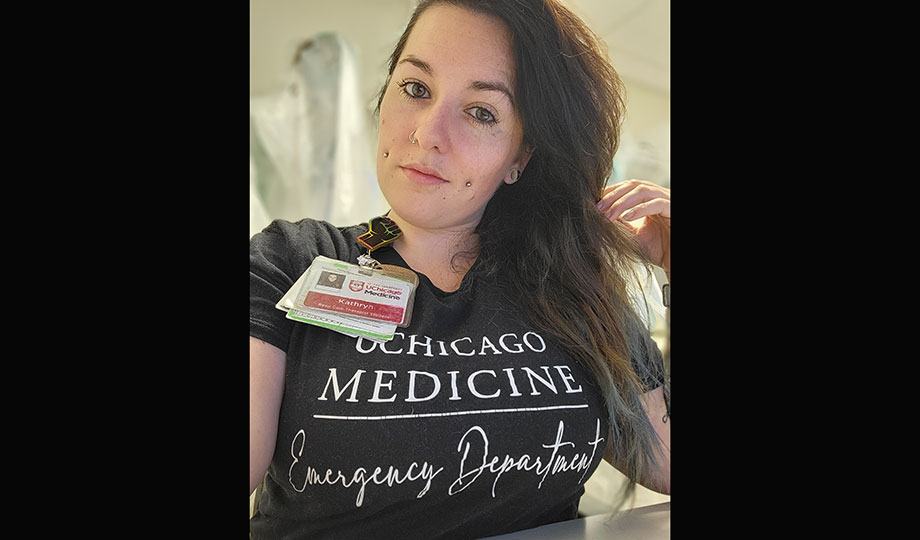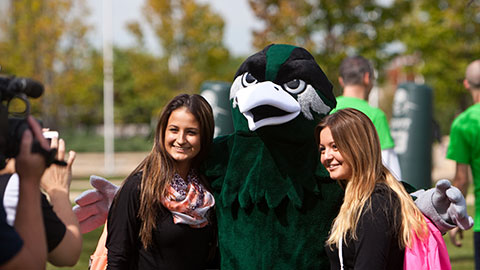The Respiratory Care Associate in Applied Science degree program prepares students to provide management of respiratory care to patients in hospitals, intensive care units, emergency rooms and diagnostic laboratories.
The full-time, two year-program includes classroom instruction and clinical practice two days a week at local hospital affiliates. Students studying respiratory care courses learn diagnostic, therapeutic, and technological arts applicable to adults, infants, and children.
Through knowledge, skills, and behavior, the Respiratory Care Program prepares students for a career as a registered respiratory therapist (RRT). RRTs are able to provide basic cardiopulmonary support, from emergency oxygen administration to management of sophisticated computerized life-support.
Upon successful completion of the program, students are eligible to take the following certification exams administered by the National Board for Respiratory Care:
- Certified Respiratory Therapist (CRT)
- Registered Respiratory Therapist (RRT)
Students who earn the Certified Respiratory Therapist (CRT) credential may apply for a Respiratory Care Practitioner license in the State of Illinois. If you intend to seek licensure outside of Illinois after finishing your program, visit professional licensure disclosure to learn more.
Admission Information
This program requires a separate admission process in addition to acceptance to College of DuPage. Prospective students must follow specific admission criteria before being admitted into the program by following the admission checklist located in the Respiratory Care Admission Packet.
Students must also view a mandatory advising session video in its entirety and complete the form as one of the mandatory steps in the application process. The advising session video will be available soon. After you complete the form, the program chair will contact you to offer a 30-minute one-on-one Zoom appointment to discuss any specific program questions you have.
Determine Your Path
Respiratory therapists work in clinical and hospital settings, home care environments, intensive care units, emergency rooms, diagnostic laboratories and skilled patient care centers. Visit the American Association for Respiratory Care or watch a video to learn what it's like to be a respiratory therapist.
You want to attend a credible college that stands out from the rest and gives you the best chance at securing a career after graduation. At COD, you'll discover:
- Small class sizes that ensure students receive personalized attention.
- Dedicated instructors with years of professional experience.
- Affordable programs to help students achieve success without creating overwhelming debt or draining a savings account.
- Instruction utilizing top-notch facilities and equipment in the Health and Science Center (HSC).
Respiratory Care
The Respiratory Care Associate in Applied Science degree program prepares eligible students to provide management of respiratory care to patients seen in hospitals, intensive care units, emergency rooms, and diagnostic laboratories.
Instructors educate students in diagnostic, therapeutic, and technologic arts as applied to the adult, neonatal, and pediatric patient.
Upon successful completion of the program, students are eligible to take the following certification exams administered by the National Board for Respiratory Care: Certified Respiratory Therapist (CRT) and Registered Respiratory Therapist (RRT). Students who earn the Certified Respiratory Therapist (CRT) credential may apply for a Respiratory Care Practitioner license in the State of Illinois.
College of DuPage, CoARC program number 200388, A.A.S. in Respiratory Therapy, Glen Ellyn, IL is accredited by the Commission on Accreditation for Respiratory Care.
Commission on Accreditation for Respiratory Care
264 Precision Blvd.
Telford, TN 37690
USA
(815) 283-2835
www.coarc.com
CoARC accredits respiratory therapy education programs in the United States. To achieve this end, it utilizes an ‘outcomes based’ process. Programmatic outcomes are performance indicators that reflect the extent to which the educational goals of the program are achieved and by which program effectiveness is documented.
Programmatic outcomes data reported on the CoARC website include:
- 3-year time period being reported
- RRT credentialing success
- Achievement of the high cut score on the TMC Exam (beginning 2018)
- Retention (Attrition)
- Job Placement
- Overall Graduate Satisfaction
- Overall Employer Satisfaction
- Total number of program enrollees
- Total number of program graduates
- Maximum Annual Enrollment
CoARC provides student/graduate and program outcomes for all CoARC accredited programs.
CoARC accredits respiratory therapy education programs in the United States. To achieve
this end, it utilizes an ‘outcomes based’ process. Programmatic outcomes are performance
indicators that reflect the extent to which the educational goals of the program are
achieved and by which program effectiveness is documented.
Get Started Today
The first step to getting started in the Respiratory Care program is to read the Respiratory Care Admission Packet and watch the Advising Session video. The packet contains an admission checklist that you will need to follow in order to be eligible for admission.
Academic and Career Pathways give you a roadmap to achieving your career goals. Follow a pathway based on your degree that outlines which classes you need to take and when so you graduate on time or move on to the next phase in your career.
The following Student Learning Outcomes are in alignment with CoARC TMC detailed content outline.
Respiratory Care program graduates will:
- Evaluate data in the patient record
- Gather clinical information through patient assessment
- Perform procedures to gather clinical information
- Evaluate procedure results
- Recommend diagnostic procedures
- Assemble and troubleshoot equipment
- Ensure infection control
- Perform quality control procedures
- Initiation and modification of interventions to maintain a patent airway
- Initiation and modification of interventions to perform airway clearance and lung expansion techniques
- Initiation and modification of interventions to support oxygenation and ventilation
- Initiation and modification administer medications and specialty gases
- Ensure modifications are made to the respiratory care plan to improve patient outcomes
- Use evidence-based medicine principles
- Provide respiratory care techniques in high-risk situations
- Assist a physician/provider in performing procedures
- Initiate and conduct patient and family education
College of DuPage has several respiratory care transfer agreements in place with four-year colleges and universities to save you time, money and make the transfer process easier.
Many of these agreements with other colleges and universities have specific course requirements and a pre-determined course plan that needs to be followed to be eligible to transfer. Contact a program faculty member or academic advisor to learn more as course requirements vary by institution.
Career Information
Explore careers based on your interest, location and salary range or view top occupations by income.
Frequently Asked Questions
Find answers to your frequently asked questions regarding the Respiratory Care program.
Check with your local community college. You may be eligible for a tuition charge-back.
This allows you to enroll in the program for in-district tuition. If you work full-time
in DuPage County, you may also be eligible for a charge-back.
Financial aid is available. Visit the Financial Aid office at the College for more information. There are scholarships available through several professional groups. Students must submit applications for these scholarships and in some cases, write an essay.
It will take two years to complete the Respiratory Care program. All courses are taught in sequence and are prerequisites for the subsequent courses.
Yes, the Respiratory Care program currently has two articulation agreements that help students earn a bachelor's degree:
- One agreement is a 3+1 through Concordia University for a Bachelor of Arts in Healthcare Administration.
- The second agreement is a 2+2 through Northern Illinois University to earn a Bachelors of Science degree. In addition, other schools may accept general education credits earned at COD.






